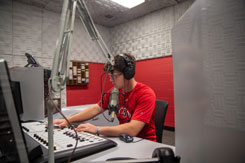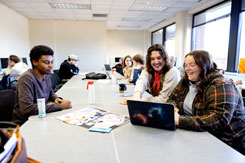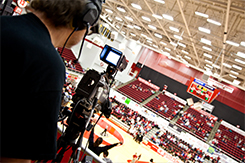Undergraduate Programs
Contact: Dr. Rob Baron, Department Chair
Phone: (931) 221-6819
Email: baronr@apsu.edu
Bachelor of Arts (B.A.) and Bachelor of Science (B.S.) in Communication Media
Three concentrations are available to students who are Communication Media majors. Students are offered a wide array of courses leading to successful careers in Broadcast Media, Journalism, and Sports Communication.

Elevate Your Career in Broadcast Media.
Broadcast Media provides hands-on opportunities from the first day students enter the classroom and studios. In small class sizes, our students learn both the theory and the practice of professional media communication, which gives them skills that translate directly into the professional world.

Master Journalism Skills.
Students who concentrate in Journalism engage in active learning, and have the opportunity to participate in service learning, as well as the opportunity to work in student media. Students can also receive real-world experience through internships, many of which are placed through department and faculty connections in the professional realm.

Transform Your Career with Sports Communication.
The award-winning Sports Communication program focuses on the structure, strategies and techniques of live sports production of APSU and area prep sports through the Austin Peay Sports Network. Students can gain four years of valuable hands-on experience in the areas of producing, directing, announcing, and all areas of radio and television sports broadcast production.
Bachelor of Arts (B.A.) and Bachelor of Science (B.S.) in Professional Communication
Three concentrations are available to students who are Professional Communication majors. Students are offered a wide array of courses leading to successful careers in Corporate Communication, Public Relations, and Information Specialist. Employers highly seek the skills gained in these concentrations and are valuable in various career paths outside the field of communication.

Elevate Your Career in Corporate Communication.
Corporate Communication students develop real world skills through practical application. Students develop effective communication skills that are useful in corporate America, can get involved in service-learning or study abroad, and can get involved in a number of professional organizations. Courses in this concentration are geared toward staying on-top of current social trends through the use of social, and students will develop effective professional writing skills as well.

Master Information Specialist Skills.
All courses in this concentration are offered online providing lots of flexibility. Students pursuing in this concentration can gain public relation skills, effective written and speaking skills, and can learn more about communication law and theories. Students in this concentration can also gain real-world experience through internships in the professional realm. The flexibility of this program allows students to gain knowledge in each of the other concentrations all online

Transform Your Career with Public Relations.
Students concentrating in Public Relations gain strong written and speaking skills as well as learning how to build relationships. Additionally, students will be able to learn more about communication law as it relates to the public while developing research skills. Public Relations students also learn how to communicate messages to the public ethically and effectively.
Minors in Communication
The Communication Arts minor provides students with skills that apply to and can enhance any career. This minor provides students access to a wide array of classes from the Department of Communication so that students can build the kind of minor that helps them meet their personal and professional goals. The minor requires 21 credit hours of elective courses in Communication. For Professional Communication or Communication Media majors, these courses cannot duplicate required classes.
This minor prepares students to assume leadership roles within the industry. It offers in-depth knowledge of event planning and event execution. In addition, students get hands-on experience working with other professionals in the industry.
This minor is most closely linked to students with Public Relations or Corporate Communication concentrations. The Public Relations and Corporate Communication industry is growing, and many available job opportunities require employees to work in event planning. These industry portions include conventions, meetings, special events, fundraisers, community events, advertising rallies, and campaign functions.
The Journalism minor allows students to develop skills for future careers at broadcast outlets, online news organizations, newspapers, and other print publications. The curriculum focuses on multimedia journalism and provides students in any major with the tools they will need to get their start in this rapidly evolving field. The minor requires 24 credit hours in Communication. For Professional Communication or Communication Media majors, these courses cannot duplicate required classes in your major.
The Popular Culture minor teaches students various methods for critically understanding popular culture. As part of this minor, students examine film, popular music, TV shows, video games, social media, sports, and other new and developing forms of popular cultural expression. The minor requires 18 credit hours in Communication. For Professional Communication or Communication Media majors, these courses cannot duplicate required classes.
Students in the Social Media Minor gain knowledge and skills that require them to use enhanced analytical and creative skills to increase their critical thinking. Students with this minor have the potential to find jobs as Social Media Associates, Social Media Managers, Social Media Marketers, Social Media Directors, or Social Media Influencers. Students can also apply these skills in other fields and areas. Emphasis is placed on theories and concepts, content creation, application, analytics, campaigns, real-world applications, ethics, content analysis, and the job market.
The Film Studies minor is offered in collaboration with the Department of Languages and Literature (18 credit hours). It is structured in three tracks (Critical Film Studies, Applied Film Studies, and Comprehensive Film Studies) to examine and apply the terms and concepts of film appreciation, theory, criticism, and production. Students who take this minor will receive an understanding of films from several different cultures and gain the ability to produce and analyze films in technical, theoretical, and cultural terms.